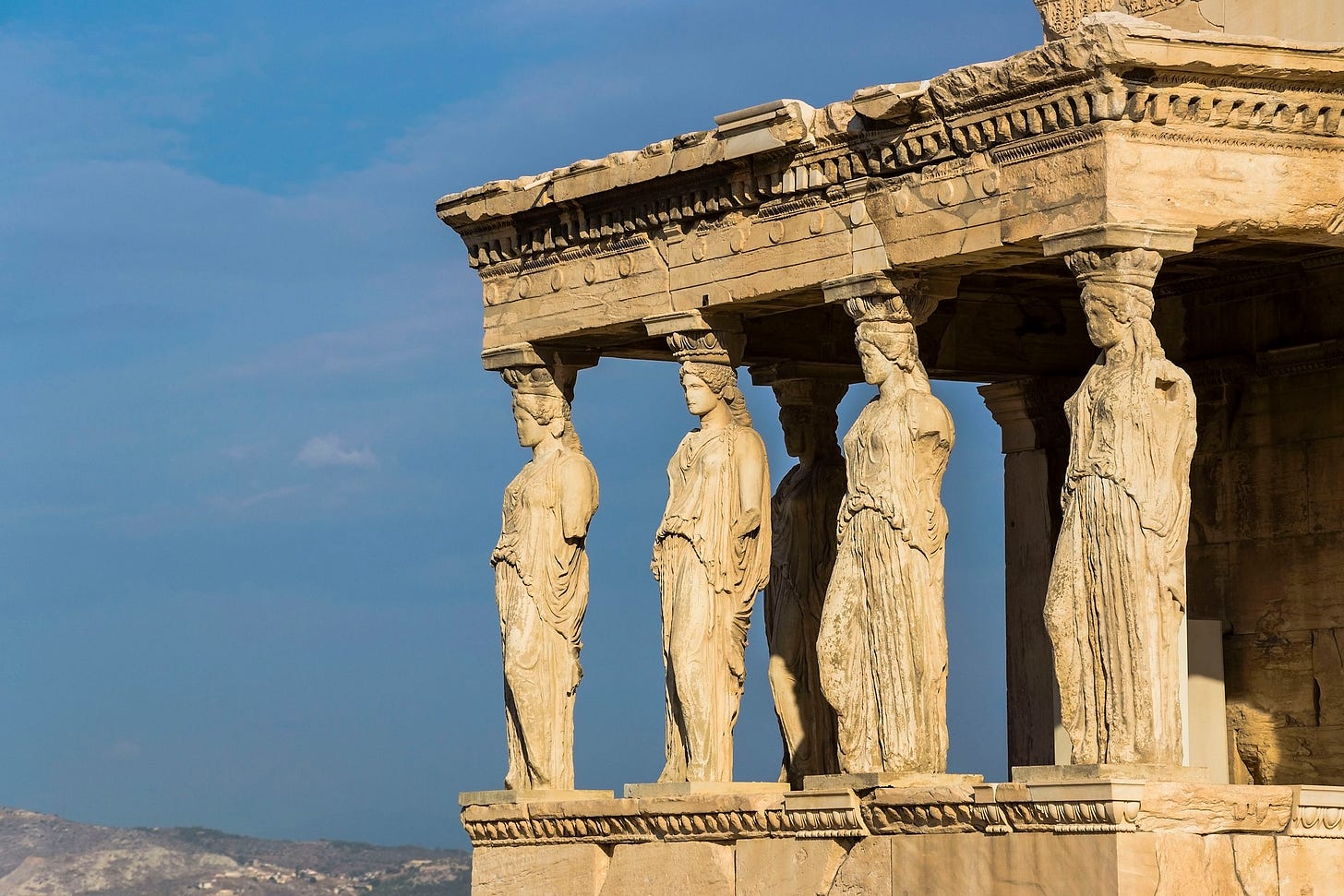The Athenian writer Thucydides helped lay the foundation for all subsequent enterprises in the field with his History of the Peloponnesian War. This unsurpassed account of Greek life in the 5th Century BCE, of Athens in full flower and its disastrous adventures, set a standard in its dispassionate portrayal of the full range of humanity — brave and cowardly, wise and foolish — that remains with us today. We spoke on our podcast with classicist and best-selling historian Tom Holland about the History and dived deep into what it has to tell us about powerful nations in the aftermath of a pandemic. (The text of the audio is below.) And if you haven’t subscribed already to WHY THE CLASSICS? you should click here — that way you’ll never miss our newsletter, hitting inboxes every Thursday.

Octavian Report: Who was Thucydides and why do we still read him?
Tom Holland: Thucydides was an Athenian general, which means that he had been elected by the Athenians to lead them in the war against Sparta which had begun in the year 431. Holding public office in Athens was often exceedingly dangerous because if you messed things up, you could end up being sent into exile. Which is what happened to Thucydides. He led a military expedition that didn't go well, so he ended up being sent into exile. This was bad for him, but good for us because in that time he set himself to writing a history of what he called the Peloponnesian War, the war against Sparta, the main city of the Peloponnese (a fork of land that is attached to the mainland of Greece).
His history is regarded as an epochal work because it takes forward what Herodotus had begun. Herodotus had begun the process of trying to apply a kind of Ionian method of enlightened analysis of the way that the world operates to the past. Thucydides focuses this process even more tightly. Herodotus's range had covered almost everything. It wasn't just what we would call history. Herodotus had looked at natural history. He'd looked at geography. He'd looked at ethnography and, notoriously, he was very prone to reporting often very tall stories.
Thucydides was much more focused. Thucydides focuses pretty much entirely on military and political matters. The one major exception to that is his recounting of the plague which hits Athens in the second year of the Peloponnesian War, the year 430 BCE. Thucydides says of this plague that it was essentially the event that did the most damage to Athens. Over the course of his history, he writes about many other Athenian defeats, many other reverses, but the reason that he includes the account of the plague is that he says that this — perhaps more than any other episode in the history of the war — had a greater impact on the ultimate result which was the defeat of Athens. And for that reason, just as Thucydides's history is the primal account of a war, of political dynamics, so also his account of the plague that hits Athens is the primal account of a great epidemic. Whenever an epidemic hits, whenever people contemplate the havoc that disease can wreak on a society, people's thoughts tend to turn back to Thucydides.
OR: What was happening in Athens and more generally in the war on the eve of the plague?
Holland: The backdrop to this is the fact that the two allies in the defeat of the Persian invasion of Greece in 480 and 479, Athens and Sparta, over the decades that followed had begun to fall out. This is a process that's been in the news a great deal recently because people have talked about there being a “Thucydidean trap.” Thucydides explains the origins of the war in the fact that Sparta as the established great power was nervous and suspicious of the rise of Athens as the new superpower on the block, and politicians have applied this with reference to the relationship of the United States to China and they back-project as well to the relationship between the United Kingdom and Germany in the buildup to the First World War. Essentially, this is what Thucydides is so good at — establishing frameworks to understand politics that supposedly are universal.
Now, that perhaps is pushing it too far. But it's certainly the case that he fixes on something that is very clear in the buildup to the outbreak of what he calls the Peloponnesian War which is indeed that Sparta — xenophobic, landbound, suspicious, and a completely menacing military machine which over the course of the previous century and more had established a kind of hegemony over much of the Peloponnese — is the superpower. Sparta is the greatest city in Greece. Athens on the back of the Persian Wars had seen first her warriors defeat the Persians at the Battle of Marathon in 490 and then her fleet take the lead in defeating the Persian fleet at the Battle of Salamis in 480. The prestige that accrued to Athens as a result of this combined with their restless trade policy, naval policy, and imperial policy enables them to establish an empire that comes to rival that of Sparta.
The difficulty for both the Spartans and the Athenians is that their power is focused in different dimensions. It's the war between the elephant and the whale. Sparta is preeminently a military power. Athens is preeminently a naval power. So in 431, when war finally breaks out, the strategy pursued by the Athenians (guided by its greatest and most influential leader Pericles) is essentially to cede even the land of Attica itself, the fields and villages that surround the city of Athens, to the Spartans.
The reason they can do that is twofold. First, they have a fleet so they can supply themselves and they can maintain their empire which is scattered across the islands of the Aegean without needing to send soldiers out of the walls. The walls are a second reason why they're able to do this. The Athenians have a port called Piraeus that's about five miles from the city of Athens. They have built what are called long walls: an entire circuit of fortifications enclosing Piraeus and Athens and the five miles between Athens and Piraeus. This is an expansive fortification larger even than the famous walls that will come to surround Constantinople centuries later.
When the Spartans invade in 431, under Pericles's guidance everybody in the countryside around Athens comes into the city and they hunker down. The Spartans burn a few olive groves, torch a few farms, but they can't really get to grips with Athens because everyone is behind the walls. So the Spartans then retreat and the campaigning season is over and it seems like a deadlock. The following year, the same thing happens. The Spartans invade and this time, we're told, they stay longer. The reason that they end up retreating is because news comes to the Spartans that something terrible is happening in Athens — the plague has arrived.
When they start seeing fire rising from funeral pyres and the news of the sufferings of the Athenians become ever more terrifying, the Spartans are nervous that they too may be infected and so they retreat. All that summer of 430, the Athenians are left to suffer within the cramped, polluted, death-haunted cityscape that is Athens in the summer of this terrible visitation.
OR: What is life like in Athens during plaguetime?
Holland: We know the plague comes to Athens through its port and the threat of this is one that, again, will be familiar to people who tracked the progress of the coronavirus. Of course, communications were much more limited in the Fifth Century BCE, but nevertheless, Athens is the great trade hub of the Eastern Mediterranean and it has shipping lanes that join it to the Persian world and to Africa. It is from Africa, we are told, that the disease initially comes. It comes through Ethiopia. It comes through Egypt. From Egypt, we're told, it then infects the Persian Empire and presumably either from Egypt or from the Persian world, it comes to Athens. It begins in Piraeus and then the infection spreads up the long walls and it then runs rife in Athens itself (which is in every sense in lockdown and unusually crowded).
There are shantytowns that have been built and constructed all around the base of the Acropolis in the theaters. It's crowded with refugees, and on top of that, Athens is in a kind of bowl. It's surrounded by mountains that make it difficult to drain off sewage, so it's stinking as well. It's overcrowded. It's sewage-ridden. The disease hits in May just as the weather is really starting to heat up. The conditions are absolutely terrible, and this is essentially why Athens uniquely gets hit by the plague. The other cities of Greece don't get hit by it. The other cities are not crowded. They're not plugged into the trade links in the same way that Athens is. Sparta, for instance, is removed from the sea so that's why nobody in Sparta seems to suffer from it at all. It's entirely Athens that suffers from it.
OR: How does Athens respond?
Holland: The initial response of the Athenians is to blame the Spartans. They ask themselves: is it coincidence that the plague arrives just as the Spartans come? But then as the Spartans leave and the plague continues to rage, they start to worry that perhaps they've done something. Is this reflective of the anger of the gods? As the disease continues to rage, so Thucydides says, people give up entirely that belief. They essentially abandon their belief in anything. Thucydides is a great pathologist not just of individual sufferers. Thucydides himself caught it and survived. He describes the symptoms. They are horrible, the concatenation of pretty much everything that you would not want to have happen to you — bile, bits of your body drop off — and he describes them in great detail, but he's also a pathologist of the city that is suffering this.
Just as he describes the physical breakdown of the body of the sufferer, so also he casts Athens itself as a body that is starting to break down. He essentially says that among the survivors and among those who've had it and then recovered, a kind of giddy sense of determination to live life to the full, to dare things, to push things to a limit starts to characterize them. This is also Thucydides's take on where Athenian strategy goes wrong: that it starts to push at military limits, it starts to push at geopolitical limits, and also it starts to push it moral limits. The implication is that the behavior of the Athenians during the years of the war that follows — and indeed the ultimate Athenian defeat — can be traced back to the shock to the body politic that the plague inflicted on Athens back in the second year of the war.
OR: It's almost as though the infection never went away. They're still carrying this germ of corruption, you seem to be suggesting.
Holland: Yes, absolutely. One of the things that's interesting is that although there are certain recurrences of the plague, it doesn't seem to have come back with anything like the same virulence. By the end of the war when the Athenians are, again, in lockdown in the city, conditions would seem just as ripe for the return of the plague. It doesn't. Thucydides's point essentially is that the aftereffects of this linger on. Presumably just as Thucydides ultimately comes back from exile when the war is lost in 404, even then there were people in Athens who'd lost limbs in the plague. They would be ghostly reminders of this horror.
Likewise in Thucydides's account, where he is clearly saying that the moral recklessness and the military recklessness that come to typify the Athenian war effort are a residue of the impact of the plague. In a way, one of the markers of that is that Pericles — the strategist who had led Athens into war and who had adopted this strategy of hunkering down, of allowing the Spartans to beat like waves against the great walls and then retreat — also dies in the plague and with him, as framed in Thucydides's narrative, this strategy that Thucydides clearly thinks was the likeliest route for success. What gives this real clarity is that the account of the plague immediately follows on what is possibly one of the most famous passages in the whole of the Peloponnesian War: Pericles's speech over the Athenians who had died in the previous year.
That would be his famous funerary speech in which he lauds Athens as a model not just in his own time, but for all future times to come, his great hymn to the democracy, to the ideals of the democracy, to Athens as an open city, a city that is open to the world. A school for Greece. All these qualities which make Athens this astonishing center of culture and political vibrancy and why we still remember it to this day are then counter-pointed to the horrors of the plague. Lurking in that is the irony that Thucydides clearly recognizes: almost everything that had served to make Athens great and successful is coming back to bite it with the plague. It's that very openness that has made Athens vulnerable to this terrible disease coming in and creating the devastation that it does. Again, we might want to think — looking at our globalized world — that there are parallels there.
OR: Are there other instances, besides the death of Pericles, that highlight this lingering moral infection?
Holland: The decision to send an expedition to Syracuse, which requires a huge investment in terms of ships and of manpower and then goes catastrophically wrong and the Athenians lose the whole lot, is the classic example.
But consider the way in which the Athenians themselves become a plague for other Greek cities that fall within their power. Athens is an imperial city. The way that Athens has established her empire is on the back of her success as the defender of Greek freedom in the Persian Wars. The Athenians liberate the Greek cities in the eastern half of the Aegean that had been under Persian rule, and she then says, "Let's set up a league to ensure that the Persians don't come back." The headquarters of this league is established on the holy island of Delos where the gods Apollo and Artemis were born, so it comes to be known as the Delian League. In due course, Athens becomes a Tony-Soprano style city. What had previously been an alliance of free cities increasingly becomes a protection racket and the funds increasingly come to be a form of tribute. It's that tribute that funds the renovation of the Acropolis under Pericles and the Parthenon, and in due course, the treasury gets removed from Delos to the Acropolis. By the time the Peloponnesian War really kicks in and as things start to go wrong for Athens, the levels of brutality with which they defend their empire come to be ever more at odds with the ideals that Pericles had articulated in his funeral speech and even more at odds with the idea of Athens as the defender of freedom that had been so evident at Marathon and Salamis. Again, I think that part of the power of Thucydides's account of the plague is the sense that this moral corruption of the Athenian people is one of the most devastating aftereffects of the plague, that it's the moral equivalent of losing your foot or being permanently debilitated.







